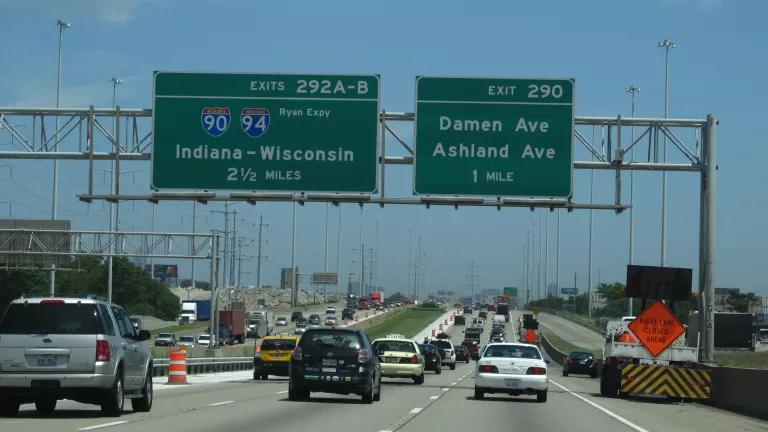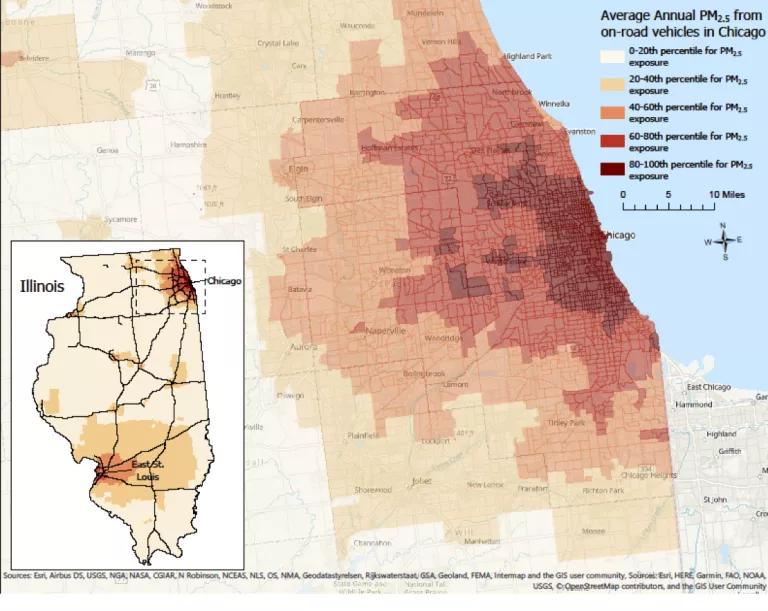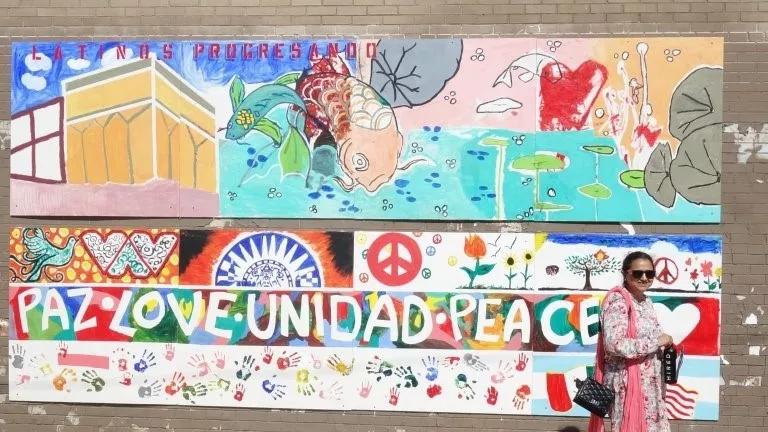Illinois Needs to Address Transportation Pollution—Not Widen I-55
Illinois has a transportation pollution problem. Expanding I-55 would only worsen it, putting vulnerable communities at risk.

I-55 in Chicago is surrounded by communities like McKinley Park, Little Village, and Pilsen. Photo by Ken Lund via Flickr. CC BY-SA 2.0.
Illinois should invest in a transportation system that is equitable and increases access to vital services, cleaner air, public transit, and lower-cost transportation options than car ownership—not in widening roads or highways.
Unfortunately, the Illinois Legislature is considering a proposal that would add multiple managed toll lanes to Interstate 55 (I-55) leading into Chicago, a project that threatens to exacerbate existing air quality issues and environmental injustices.
Illinois’ transportation system is already a top driver of climate change and air pollution
Our transportation system has major implications for climate, health, and equity. As the threat to our climate and our health from fossil fuel burning power plants has decreased, transportation has emerged as the top source of greenhouse gas emissions in Illinois.
Vehicles also emit dangerous air pollutants like particulate matter and nitrogen dioxide linked to increased illness and death. Pollution from diesel engines alone is projected to cause 400 early deaths, nearly 200 heart attacks and thousands of respiratory illnesses this year in Illinois.
Vehicle pollution also creates health disparities. A new analysis by Northwestern University found that Chicago communities located near highways and neighborhoods on the city’s South and West sides are exposed to the highest concentrations of air pollution. A Union of Concerned Scientists analysis also found that Black and Latino Illinoisans breathe about 20 percent more particulate matter from tailpipe pollution than the average Illinois resident, while white Illinoisans are actually exposed to 13 percent less particulate matter pollution than average for the state. And, let’s not forget that there are many other sources of pollution that communities of color and low-income residents are bearing the brunt of, including corporate polluters like those that manufacture asphalt for highways.

Average Annual PM2.5 from on-road vehicles in Chicago area
OpenStreetMap contributors and the GIS User Community
We need a new vision for our transportation system that prioritizes health, community benefits, economic development, affordability, accessibility, and public transit. That means investing in ways Illinoisans can get around without relying on a ten-lane highway.
Expanding Illinois highways would exacerbate our climate and air pollution problem
Adding lanes to our state’s highways would increase greenhouse gas emissions, undermining the state’s goals to protect our climate. Highway expansions also put already overburdened environmental justice communities that live alongside them at risk.
In the fever dream of a film, Field of Dreams, Kevin Costner hears a whisper in a cornfield: “If you build it, he will come.” Well, that’s basically what happens when we add lanes to a highway—instead of reducing commute times and easing congestion, more people end up on the roads. Study after study show that highway expansions entice more people to drive and don’t reduce congestion in the long-term. Instead, they increase the overall number of miles people are traveling using vehicles, leaving communities with dirtier air.
Neighborhoods on the Southwest Side of Chicago, bisected by I-55, already face some of the worst air pollution in the country. What’s more, these communities were not meaningfully engaged or consulted on this project that would directly impact their lives, and the environmental analysis for this project is years old and arguably obsolete.
Increased highway capacity will lead to more harmful emissions in an area already overburdened by high asthma rates and other chronic health problems, doubling down on the shameful history of prioritizing harmful transportation infrastructure over the health and safety of communities of color living nearby.
State leaders should be working to reduce the amount of vehicular traffic generating harmful air pollution, not expand it.
Illinoisans are calling for real transportation solutions, not bigger highways
NRDC Action Fund conducted statewide public opinion research in the fall of 2022 to explore Illinois residents’ priorities for transportation investments. The polling found that the majority of Illinoisans do not support projects that would expand roads or highways. Instead, 61 percent of Illinois residents support shifting investments away from expanding roads toward investing in a transportation system that makes it easier and safer for people to walk, bike, and take public transit. And nearly all—92 percent, across partisan divides—support prioritizing maintaining and repairing existing roads, highways, and bridges over widening roads and highways.
A large majority of Illinoisans (76 percent) are also calling for more community input into transportation decisions, and 61 percent believe that state investments in transportation should benefit underserved communities and neighborhoods that have been most impacted by dirty air from car and truck traffic.
This I-55 proposal is completely out of alignment with what Illinoisans support. Instead, legislators and IDOT should be looking to maintain and repair existing roads, increase public transit service and infrastructure for walking and biking, and reduce the transportation system’s impact on our air quality. Highway maintenance and investing in public transit also offer more job opportunities than expanding I-55, an expensive project that would feature costly tolls. It's worth noting that currently, only six daily weekday trains run on the Metra Heritage Corridor, which serves the same route as the I-55 expansion.
Creating managed toll lanes on I-55 would likely worsen climate change, increase pollution and put already overburdened environmental justice communities at risk. It’s time for Illinois’ vision for our transportation system to align with addressing the climate crisis—and with what Illinoisans want to see. The Illinois legislature must say no to highway expansions and yes to transportation investments that ensure people have access to clean air, a livable climate, and affordable, accessible, sustainable ways of getting around that benefit all communities, regardless of wealth or zip code.



